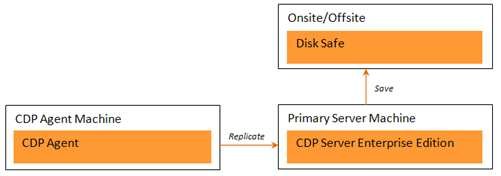If you have a CDP Enterprise Server installed and are regularly processing the replication of sensitive and important data, your server deployment may function according to the following model:

However, with such a server deployment model, the CDP Server itself could potentially crash due to hardware failure, virus attack, etc. To be prepared for such a scenario, you can run another CDP Server enabling you to protect the machine with your primary CDP Server installed. The function that allows you to do this is called "Multi-Point Replication" and is built into your CDP Enterprise Server. Once you install an Agent on your primary CDP Enterprise Server machine, it can be replicated by a secondary CDP Enterprise Server. You can replicate a running CDP Server with open Disk Safes. Multi-Point Replication enables you to make a second copy of the selected Disk Safes.

Features
- Onsite/offsite backups
- Redundant onsite backups
- Second copy of selected Disk Safe(s)
- Agent is not impacted by the redundant backup
- Minimal impact on Disk I/O and bandwidth using CDP process to replicate changes from primary backup to secondary backup
- CDP can be safely replicated by CDP even when Disk Safes are open
- No interruption to the CDP Server during the redundant replication
Limitations
- If the primary Disk Safe fails, the redundant Disk Safe must first be restored from the redundant (offsite) location before restoring an Agent or its files.
- Primary Disk Safes must be stored on a supported storage format for CDP replication:
Windows
| Primary Storage Types | Directly Attached Storage Including: IDE, SATA, SCSI, SAS, ISCSI, Fibre Channel, Dynamic Disks (Software RAID), Hardware RAID Solid State Drives (SSD) |
|---|---|
| File Systems | NTFS (512 byte - 64 KB cluster sizes) |
Linux
| Primary Storage Types | Directly Attached Storage Including: IDE, SATA, SCSI, SAS, ISCSI, Fibre Channel, Dynamic Disks (Software RAID), Hardware RAID Solid State Drives (SSD) |
|---|---|
| File Systems | ReiserFS 3, Ext2, Ext3, Ext4 |
For further instructions, see:
